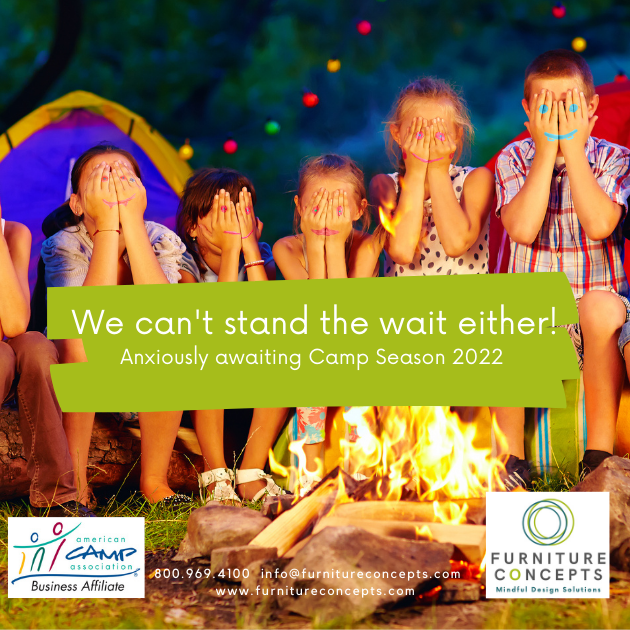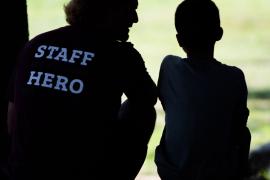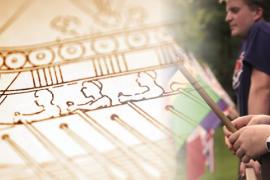Bereavement camps for children are now commonplace around the United States (McClatchey & Wimmer, 2018). Some of these are recreational, and others are more clinically focused. Most do not include a parent/guardian component in which parents participate in the activities with their children or in a separate adult session over the duration of their children’s bereavement camp (McClatchey & Wimmer, 2018).
Although adult grief camp sessions are not commonplace, research shows that how parents respond to their child’s loss can impact the child either positively or negatively (Cipriano & Cipriano, 2019). Evidence shows that parents who understand their grieving child’s unique needs can aid in the child’s healing process (Bugge et al., 2014) and mitigate long-term bereavement risks, which can include:
- Depression
- Suicidal thoughts or behaviors
- Anxiety, including post-traumatic stress disorder
- Significant sleep disturbances
- Increased likelihood of physical illness, such as heart disease, cancer, or high blood pressure
- Long-term difficulty with daily living, relationships, or work activities
- Alcohol use, nicotine use, or substance misuse (Mayo Clinic, 2021)
Research also suggests that parents who are able to attend to their own needs may be more helpful in aiding their grieving child (Werner-Lin & Biank, 2012).
A guardian component can easily be added to a children’s bereavement camp’s curriculum with limited additional cost. For camps that might be considering a bereavement program designed for the whole family, the following is a description of an adult session at Camp MAGIK, a weekend healing camp for bereaved children and teens. The adult session runs parallel to the children’s camp. Camp MAGIK has made a conscious decision to separate parents from children to allow the parents to process their own grief and be able to freely share any issues they wish to address — while allowing their children to do the same.
Camp MAGIK
Camp MAGIK is a nonprofit organization in Georgia providing weekend healing camps to bereaved children and their caregivers. Sessions are held three times a year, each serving approximately 80 campers and 10 to 25 caregivers. Camp MAGIK was founded in 1995 and has served over 5,000 campers to date.
The first adult weekend session was incorporated into the healing camp more than 15 years ago. Parent sessions include room and board for the participants and assigned counselors. Camp MAGIK pays the professional counselors a minimum stipend for the weekend, but other camps may choose not to do so.
Before Camp
It is important to select a campsite that cannot only appropriately accommodate children and teen campers, but also have lodging where the adults can stay. Ideally, the campsite should provide privacy for the adults away from their children, with their own bedrooms, bath facilities, and designated area for eating meals. Some campsites can’t meet all these needs, but as long as the adults have private sleeping quarters and space to hold their counseling sessions, they may join their children at mealtimes. As an option, camps may still wish to seat parents away from the other campers or schedule separate mealtimes in the same dining hall. Separation minimizes the disruption that can occur when parents and children attempt to interact with each other to catch up and see how things are going. Interaction is not inappropriate per se, but since not every child at bereavement camp will have a parent or guardian attending with them, such exchanges may remind lone campers of their adults’ absence. Specific time is set aside at camp for campers to interact and catch up with their adults over the weekend.
The location chosen should also offer activities the attending adults can enjoy during their free time, such as canoes, hiking trails, or board games.
Camp MAGIK sends out an announcement of its upcoming sessions at the beginning of each year. The application form to camp includes a section asking about the parent’s desire to participate in a weekend session, referred to as a “retreat,” that takes place at the same time and place as their child’s camp experience. Another option for the adults is a Sunday, mid-morning educational workshop that includes information on how children and teens grieve differently from adults, and what adults in a child’s life can do to help them navigate the grieving process. The workshop option is offered at no cost to the adults. However, Camp MAGIK charges a minimal registration fee for the retreat that is refundable for up to one week before camp. The registration fee demonstrates the adult participants’ commitment to attending so that when time comes, all campers and their guardians are accurately accounted for.
Screening the adults who sign up for camp is an important step. The adult retreat is for parents who are experiencing their own grief over the same loss as their participating children. If an adult is sending a child to camp who has lost a father, for example, and the couple has been divorced for many years, they may not be appropriate to participate in the adult session. Nor is the retreat for parents who are concerned about sending their children off for the weekend and simply want to stay close by.
Professional mental health counselors are hired for the adult weekend retreat. To be mindful of the diversity of camp participants, efforts are made for one counselor to be female, one male, one white, and one a person of color. Typically, over one-third of the campers are Black, and the remaining are mostly white with a smaller LatinX percentage. Counselors selected must be well versed in working with bereaved as well as traumatized populations to understand the complex experiences these families have been through. Camp participants deal with many issues that complicate and confound their grief journeys.
At Camp
When families arrive at camp, the children and teens are checked in first, and the adults are encouraged to settle their children in their cabins before coming back to the registration area to check into the adult retreat. The counselors for the adults guide them to their cabins, and after settling in, the participating parents introduce themselves to each other and briefly tell others their reasons for coming to camp. Adult participants are always tempted to engage in a more in-depth discussion on this first evening, because this is often the first time many of them are presented with the opportunity to share their stories with others who have had similar experiences. However, the counselors need to help the participants avoid oversharing on the first night, as doing so at this time may lead the parents to feel too vulnerable and cause them to limit their participation for the rest of the retreat. Likewise, camp counselors for the young campers also discourage the children from “oversharing” too quickly.
The first evening includes a psychoeducational session in which the counselors discuss various grief reactions — including emotional, behavioral, mental, physical, and spiritual issues — in an attempt to normalize the participants’ experiences. A review of some of the more common theories of the grief process is shared with the adult participants.
The second day of the retreat begins with a review of mindful breathing exercises. This technique is then incorporated into the beginning and end of each group session. After this introduction, the participants share their stories with each other in as much detail as they feel comfortable. If the number of adults is higher than ten, the participants are split into two smaller groups. Typically, spouses and relatives are placed in different groups, but at the same time, the counselors attempt to put participants with similar types of loss in the same group.
Generally, the first morning is filled with instructions on mindful breathing and participants sharing their stories. After lunch and some free time, the counselors share additional coping strategies, such as:
- Relaxation techniques (e.g., deep breathing, listening to music)
- Guided imagery exercises (see sidebar for more information)
- Thought stopping
- Positive self-talk
- Physical exercise
- Dancing
- Reading
- Sharing memories or thoughts and feelings with others
- Journaling
What Is Guided Imagery?
Guided imagery is a technique for focusing on a positive image in one’s head as a way to create harmony between body and mind. Guided imagery involves all the senses. One way to conduct guided imagery is to have someone read a script that instructs participants to get as comfortable as possible, take deep breaths, and get deeply relaxed by releasing all their muscle tension and imagining a place where they feel safe. For some this could be resting by a waterfall, sitting by a fire, or curled up on their favorite spot on a couch. Participants are then asked to experience this scene with their mind’s eye, that is, to experience what it smells, tastes, sounds, and feels like. Once the campers/adults are ready to come back to reality, the reader counts backwards from five to zero, telling participants that at “one” they will open their eyes and feel awake, alert, and relaxed.
Guided imagery is sometimes called “guided meditation” or “visualization” and is a powerful stress reducer.
Camp provides the adult campers with a conveniently sized journal so they can begin to write down their thoughts and feelings. In group, participants share what coping skills have worked for them in the past or may help them in the future. The counselors reinforce the importance of mindful breathing and introduce additional skills to help the parents “stay in the moment” with their feelings. The counselors discuss concepts such as cognitive restructuring and how our thoughts influence our feelings and behaviors. Participants experiment with different ways of viewing events in their lives and their emotional connections to their own unique grief and loss experiences.
The adult campers attend a play that details the narratives of two adolescents who have lost a mother and brother, respectively. The play serves as a springboard for the adults to create their own unique “memory collage” representing their lost loved one. They share their memories with each other, using their collages to help guide the process.
After enjoying more free time, the adults begin to prepare for that evening’s memorial service. Each participant attaches a candle to a large magnolia leaf and prepares what they wish to say to their lost loved one when they walk down to the camp lake to light and launch their candle. Some participants write a poem; others find a quote or poem to recite. Camp typically holds this ceremony after dark for greater effect. In the dark, everyone has an opportunity to say or read what they wish to share with their deceased loved one and then watch the lit candle drift slowly across the water. After everyone has launched their candles, the camp plays special music the group has chosen together. The memorial service is followed by a period of silence, and before bed they participate in a relaxing and comforting guided imagery exercise.
The last day of the weekend starts with the participants reflecting on their memorial service experience followed by a letter-writing exercise. The letter is an opportunity for the adults to share anything that may have been left unsaid or a recent update of their own lives. Then participants write an imaginary letter from the deceased loved one to themselves. This special letter can be very therapeutic, often providing the participants, who often harbor feelings of guilt for real or imagined mistakes they have made, a healthier and more realistic view of their experience. After the letters are written the adults send their messages to their loved ones in a release of environmentally friendly balloons.
The balloon release concludes the session attended by the adult retreat participants. The hour before lunch, they are joined by parents who come for the psychoeducational portion of the adult program. This session is led by the camp director who is a licensed clinical social worker with many years of experience working with traumatically bereaved families. The session consists of information on how children grieve differently from adults, how the caregivers in children’s lives can help them navigate the grief process, and how to support their children. Trauma symptoms are carefully explained and addressed in this meeting. Additionally, the adults are informed about how camp has addressed symptoms of grief and trauma among participating children and teens.
The last of the camp activities for the adults involves a community cookout. Here all parents, campers, and counselors meet together to celebrate the end of camp. During this time, parents have a chance to meet with their child’s counselor to get information on how their child is coping with grief. The counselors, all trained mental health clinicians, are careful to share information without violating the child’s confidentiality. The children’s counselors have informed the children before the cookout of the upcoming meeting with their parents — and they’ve covered what the kids want the counselors to share and what, if anything, they don’t want their parents to know. As long as the subjects the children have brought up as absolute no-no’s to share with parents do not put them or others at risk for harm, the counselors do not divulge those issues. Or, if such information would not put anybody at risk but could be beneficial for parents to know, counselors may negotiate with the campers to see if they will allow it to be shared.
In the closing ceremony that follows, all campers (children and adults) are recognized individually. At this time, special items are given out, such as participation certificates, T-shirts, backpacks, and stress balls. The families are also given a “communication” book. This is a blank notebook they can use as a method for communication in the family. The notebook can be placed in an area accessible to all family members where they can write down thoughts and emotions they do not feel ready to share verbally. The book will always be available for all members of the family to read.
After Camp
Each year, all campers and their families are invited to an annual reunion activity, and all families receive follow-up calls and mailings from their camp counselors and from the camp director. The follow-up calls serve as a way to check on campers and to answer any questions that may have arisen since camp. Mailings include new research findings and news clips of grief narratives and important information. Campers are also assessed for any additional needs and are referred to appropriate resources if an issue is identified.
The camp director’s call is partly for quality control — checking on the families and making sure the counselors have been in touch with them and how the children are progressing. The director also asks parents who participated in the adult retreat about the benefits of the experience.
On one such call recently, Avery, who lost her partner to a heart condition and brought their five children to bereavement camp, described the benefit as, “meeting other people in the group that went through the same thing pretty much to where I could talk to them. It helped. It helped a lot.”
Likewise, Sharon, who lost her husband to a brain tumor and whose son and daughter participated in the children’s camp, commented, “It [camp]was awesome, just the support and advice.”
Elise, who lost her son in a motor vehicle accident and brought her daughter to camp, spoke about the impact of her experience: “It gave me more reassurance, or I felt more . . . this is going to be okay.”
These comments from adult participants are typical, and they serve to confirm that having counseling sessions available for adults who care for bereaved children can help them attend to their own needs during their grieving process. By doing so, they help their children navigate the grieving process and mitigate future bereavement issues.
Bereavement Resources
- The Eluna Network is an organization dedicated to supporting children and their families impacted by grief and addiction — elunanetwork.org/.
- The National Alliance for Children’s Grief (NACG) is a nonprofit organization that raises awareness about the needs of children and teens who are grieving a death and provides education and resources for anyone who supports them — childrengrieve.org.
- The New York Life Foundation supports programs that benefit young people, primarily through two distinct focus areas: childhood bereavement and educational enhancement for middle school children — newyorklife.com/foundation.
- Compassionate Friends is a bereavement organization for parents who have lost a child. To find a chapter in your area, go to compassionatefriends.org and click on “local chapters,” or call 877-969-0010.
- Grief Share is a resource guide to find grief support groups in your area — griefshare.org. Type in your zip code to search for groups close to you, or call 800-395-5755.
- Local hospices provide bereavement services for free. To locate a hospice close to you, go to nhpco.org and click on “find a provider,” or call 800-658-8898.
Irene McClatchey, PhD, LCSW, is a professor and the MSW program director at Kennesaw State University where she teaches Death and Dying and conducts research on childhood grief. She is also the founder and director of Camp MAGIK, a nonprofit organization providing weekend healing camps for bereaved children and their caregivers.
Steve King, PhD, LCSW, is an associate professor in the department of Social Work and Human Services at Kennesaw State University where he teaches clinical social work practice courses. His research includes the use of empathy in social work practice and the training of helping professionals. He has been a clinical counselor at Camp MAGIK for the last three years.
References
Bugge, K. E., Darbyshire, P., Rokholt, E. G., Haugstvedt, K. T. S., & Helseth, S. (2014) Young children's grief: Parents’ understanding and coping. Death Studies, 38(1), 36–43. doi.org/10.1080/07481187.2012.718037
Cipriano, D. J. & Cipriano, M. R. (2019). Factors underlying the relationship between parent and child grief. OMEGA – Journal of Death and Dying, 80(1), 120–136. doi.org/10.1177/0030222817726935
Eluna (2020). Supporting children and families impacted by grief or addiction. elunanetwork.org/
Mayo Clinic. (2021). Complicated grief. mayoclinic.org/diseases-conditions/complicated-grief/symptoms-causes/syc-20360374
McClatchey, I. S., & Wimmer, J. (2018). Bereavement camps for children and adolescents: Planning, curriculum, and evaluation. New York, NY: Routledge.
Werner-Lin, A. & Biank, N. M. (2012). Holding parents so they can hold their children: Grief work with surviving spouses to support parentally bereaved children. OMEGA – Journal of Death and Dying, 66(1), 1–16. doi.org/10.2190/OM.66.1.a




